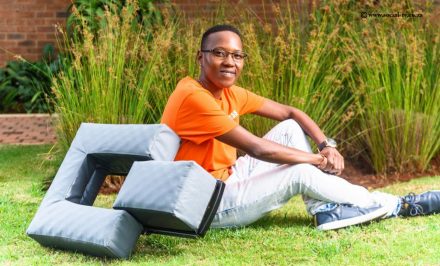 Cameroon : Dr. Yasmine Ndassa, the research scientist turned data storyteller
Cameroon : Dr. Yasmine Ndassa, the research scientist turned data storyteller
 Julien Ngum Che : advocating for the rights of displaced women and youth in Cameroon
Julien Ngum Che : advocating for the rights of displaced women and youth in Cameroon
 Chilufya Mutale Mwila, the Zambian entrepreneur driving financial inclusion across Africa
Chilufya Mutale Mwila, the Zambian entrepreneur driving financial inclusion across Africa
 Wangari Muchiri, the Kenyan engineer committed to accelerating the ecological transition in Africa
Wangari Muchiri, the Kenyan engineer committed to accelerating the ecological transition in Africa


Portia Mavhungu is a young South African entrepreneur. In 2019, she created the Para-Tube, a seat-based device that allows wheelchair users to use toilets without assistance.
The device launched by Portia Mavhungu was developed by her company PRD Logical Solutions (PTY), whose aim is to develop solutions to make life easier for people with disabilities (PSH). It allows them, in particular, to be more independent and maintain their dignity. It incorporates toilets that include disposable and biodegradable bags, giving them the possibility to relieve themselves without any assistance.
Raised in an Indian family for which her mother worked, Portia Mavhungu wanted to study theater since her childhood. Unfortunately, she finally found herself studying marketing. Two years later, she dropped out of the program due to a lack of interest. She then got a job at Telkom, the South African telecommunications company where she learnt computer science. In addition to her work, she became passionate about entrepreneurship, especially social entrepreneurship.
In 2011, following a major accident she was a victim of, she decided to start her own business. She developed the idea of creating a Para-tube for people with disabilities. Victim of a fractured pelvis, she was forced to remain in a wheelchair during her convalescence. She had to rely on her mother on whom she depended permanently for various needs, including going to the toilet. She experienced the difficulties faced by people with disabilities. Once she recovered, she decided to help them by creating a device that would allow them to be independent.
Facing obstacles
Although she had an innovative idea, she still faced several challenges in bringing it to fruition, including her family’s doubts about the project and the problem of financing to create the prototype and develop the business. Despite the resistance of her family, she persevered. In 2019, she obtained several financing deals, including one from a south african institution, notably the Industrial Development Corporation, to be able to invent her device.
To optimize her resources, limit the expenses and above all reduce costs for users, she manufactured her system from ready-to-use components and assembled them locally. Today, the device has been tested in retirement homes in South Africa where there is a great need. It is expected to be sold throughout South Africa by early January 2021. It has also been patented in South Africa, China and the United States for commercialization.